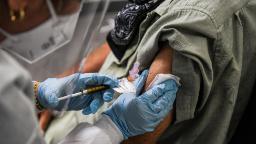
An effective vaccine has been touted as the magic bullet that will allow the global economy to quickly shift back into gear. Yet there are reasons why the recovery may be slow going: vaccines are typically not 100% effective and there will be a limited number of doses to go around. Distribution could be a problem, both between countries and within them. Even if those challenges are overcome, some people may choose not to take the vaccine.
Neil Shearing, group chief economist at Capital Economics, wrote recently in a research note that there are a range of potential outcomes for economies once a vaccine is certified. And it would be wrong, he said, to assume that a vaccine will transform the economic outlook for next year.
“At one end of the spectrum lies a highly effective vaccine that is produced and distributed quickly. At the other lies a less effective vaccine that faces significant production and distribution challenges and would be in relatively short supply in 2021,” he said. “In most scenarios in between, it is likely that containment measures, including social distancing and restrictions on some foreign travel, will remain in place for the foreseeable future.”
The first challenge is the vaccine itself: The World Health Organization has said it would prefer a vaccine to be at least 70% effective, but it has set its minimum threshold for a Covid-19 vaccine at 50%. That means every other person who is vaccinated may still be at risk of an infection that would prevent them from working and spending money.
Supply is another important factor: According to Shearing, figures from developers suggest 1 billion doses may be available this year, with another 7 billion ready for distribution in 2021. But those numbers assume multiple vaccines are approved, and supply could turn out to be significantly lower. Specialized needles and syringes will be needed to administer the vaccine, but countries including the United States don’t have enough on hand. There’s also a global shortage of glass vials to contend with. The WHO does not expect widespread vaccinations until the middle of next year, a spokesperson said Friday.
Finally, many people are reluctant to take a vaccine: According to a survey commissioned by Deutsche Bank, only 61% of people in France say they plan to take a vaccine if one is certified in the next six months, while the same is true for 70% to 75% of Germans, Italians, Spanish, Brits and Americans. In Europe, only half of the population agreed that “vaccines are safe,” the bank said last week in a research note.
“From the perspective of the global economy the issue is not as simple as whether there is or isn’t a vaccine,” said Shearing.
Market insight: Biotech and pharma stocks like Moderna have soared this year on the promise of developing a potential vaccine, in part due to enthusiasm from retail investors. Those traders that have been snapping up shares on platforms like Robinhood could be burned if trials don’t pan out or distribution challenges emerge.
Table Of Contents
‘Mulan’ may have to conquer the world
Studios are hoping that international revenue can help sustain Hollywood while the United States struggles to regain its footing after a fumbled coronavirus response.
With theatrical exhibition in the United States only now lurching back to life, revenue from other countries — especially China, but also Europe — is the most closely watched barometer for the industry.
After multiple delays, the studio is releasing the live-action remake of the 1998 animated classic only on its new streaming service Disney+ in the United States on Friday. It will also open theatrically in a handful of international markets.
The idea of a blockbuster like “Mulan” opening in theaters overseas but not in the United States was inconceivable only a few months ago. The move could be a “transformative” moment for Hollywood, according to Aynne Kokas, an associate professor at the University of Virginia and author of “Hollywood Made In China.”
“The US is the largest box-office market in the world. It likely will not maintain that title this year if the COVID restrictions continue,” Kokas said. “This could be a blip if the US is able to return to its previous situation, or it could be an inflection point.”
China’s movie theaters have already enjoyed some success since reopening, including with the war epic “The Eight Hundred.” The film has grossed $277 million in China since its release last month, making it the year’s third-best performing movie, according to Box Office Mojo.
Up next
Monday: US markets closed
Tuesday: Slack and Lululemon earnings
Wednesday: China inflation data; Bank of Canada meeting; GameStop earnings
Thursday: US initial unemployment claims; Chewy and Peloton earnings; European Central Bank meeting
Friday: US inflation data; Kroger earnings